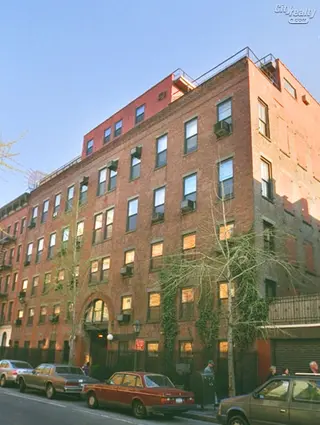 Carter Horsley
Carter HorsleyDec 23, 2011
Carter's Review
This handsome and charming group of 6-story buildings was a former piano factory complex and was converted to 48 cooperative loft apartments in 1982 by Richard A. Klein and Charles P. West.
An original yard that contained storage sheds is now a landscaped courtyard surrounded by restored original iron catwalks/skybridges connecting the north and south buildings.
The development is known as The Piano Factory and is known as 454 West 46th street, 455-463 West 45th Street and 636-8 Tenth Avenue.
When it opened in 1982, it was the largest market-rate housing development in Hell's Kitchen and one of the first to be developed in the Clinton Preservation District.
The buildings date back to 1874 when the Wessell, Nickel & Gross Company, a piano actions manufacturer, was established at the location where it would expand until it went out of business in the 1930s. Otto Wessell, Adam Nickel and Rudolph Gross had previously worked for Steinway & Sons.
The main Romanesque-revival entrance is a large iron gate flanked by globe light sconces and beneath a semi-circular window.
The building was included in an article by Dee Wedemeyer in the May 2, 1982 edition of the The New York Times:
"At the Piano Factory at 454 West 46th Street, where tulips and azaleas have been planted in an interior courtyard, some apartments have exterior hallways. One line of apartment has a backdoor 'balcony' that is part of an original skywalk. The courtyard enables the building to have a high percentage of windows and since so many entrances are in view of the residents, it is also a security factor. The co-op has a guard from 4 P.M. to 8 A.M. All appliances are included but there are no medicine cabinets. 'Our option was for big mirrors instead,' said Charles P. West, a partner in the development. Some apartments have a walk-in closet with plumbing for a second bath. Half of the 48 apartments are sold, enough to get permanent financing and turn the building over to the tenant shareholders. Prices for the unsold apartments range from $99,000 to $165,000, more for penthouses."
Edward Deitch wrote in a November 15, 1981 article in The New York Times that "
Charles West and his partner, Richard Klein, had not planned on naming their 48-unit cooperative at 454 West 46th Street," adding that "Mr. West said he thought most names used for residential buildings were ''hackneyed and pretentious.'"
The article said that "Nonetheless, a pair of brass plaques announce the name of this complex of four old red-brick buildings: The Piano Factory," and the "developers discovered that older residents of the neighborhood referred to the complex as the piano factory." Mr. West, the article continued, "said that, because the buildings had always been known as the piano factory, it was a 'genuine' name. 'People used it,' he said. 'We just carried it on.'''

- Co-op built in 1890
- Located in Midtown West
- 48 total apartments 48 total apartments
- 10 recent sales ($487K to $2.6M)
- Doorman
- Pets Allowed

 6sqft delivers the latest on real estate, architecture, and design, straight from New York City.
6sqft delivers the latest on real estate, architecture, and design, straight from New York City.
